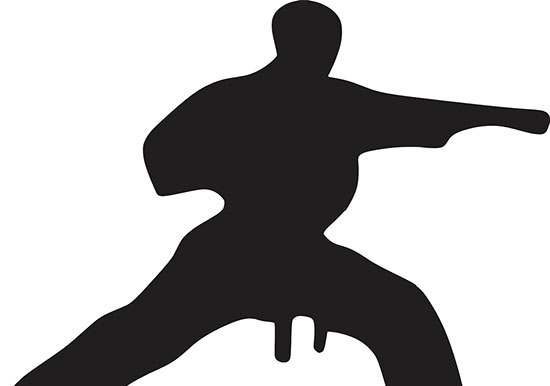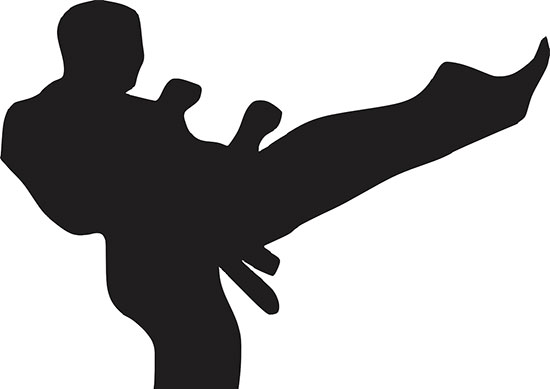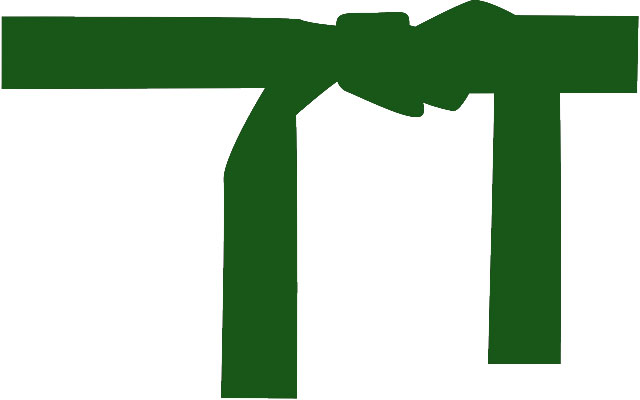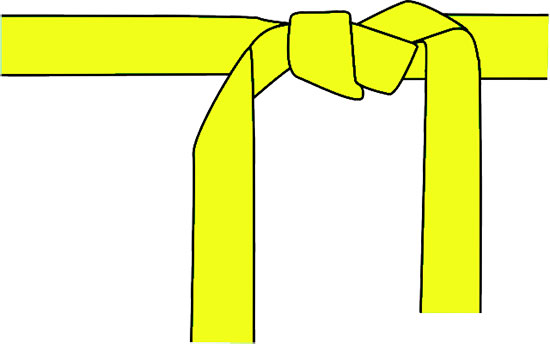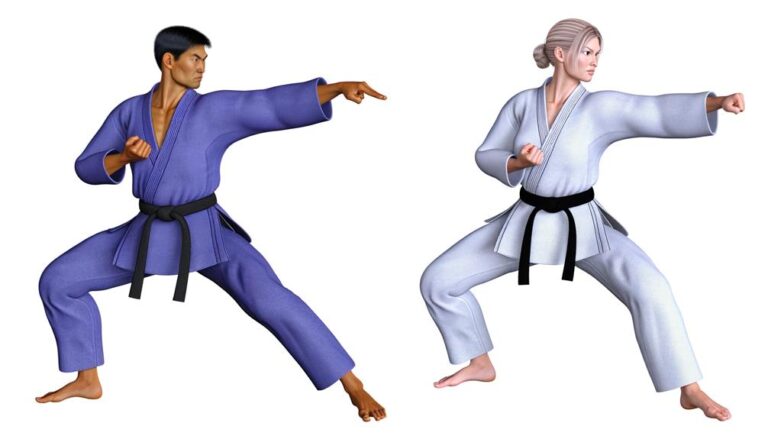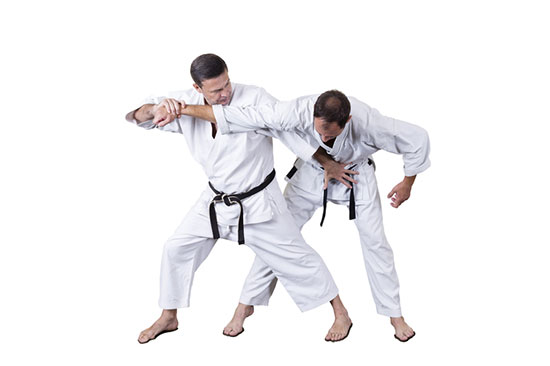Beneath the black belt, there’s a complex cascade of categories, each carrying considerable significance in the world of karate.
As you embark on this martial arts journey, it’s crucial to understand the nuanced steps and substantial strides that lie ahead.
From the foundational first degree, known as Shodan, to the revered ranks of Renshi, Kyoshi, and Hanshi, the path is paved with both physical prowess and mental mastery.
Each level not only demands dedication but also deepens one’s connection to the art.
Unraveling the intricacies of these levels offers insight into the discipline, dedication, and depth of karate, inviting you to explore how each rank shapes the practitioner, not just in technique but in character.
What lies beyond the surface of these titles and ceremonies may surprise you, hinting at a rich tapestry of tradition and transformation that awaits.
Contents
The First Degree: Shodan
Achieving Shodan, the initial black belt level in karate signifies not only your competence and dedication to the art but also marks the beginning of an advanced journey of learning and leadership.
The first degree: shodan, requires a profound understanding of fundamental techniques and katas, honed through years of training. It’s not merely about physical prowess; it demands mental discipline and the ability to serve as a role model.
Being awarded the first black belt doesn’t mean your learning ceases. It signifies a transition from learner to leader, still under the tutelage of more experienced mentors. You’re expected to continuously refine your skills, contributing to your development and the karate community.
Second Degree: Nidan
Upon reaching the Nidan level, you’ve demonstrated a deeper commitment and heightened expertise in karate, marking a significant progression in your martial arts journey.
As a second degree, or Nidan, your dan black belt symbolizes not only your solid understanding of fundamental techniques and katas but also your capability to handle more advanced and complex kumite techniques.
You’re now expected to exhibit improved physical and mental discipline. Additionally, wearing the stripes on the belt, you often assist in instructing lower-ranked students and sharing your knowledge and experience.
| Level | Expertise | Responsibilities |
|---|---|---|
| Nidan | Advanced | Assisting in instruction |
| Complex kumite techniques | Improved discipline | |
| Solid understanding of katas |
Third Degree: Sandan
As you approach the Sandan level, the training requirements intensify, demanding unparalleled dedication and skill refinement. You’ll navigate through rigorous steps, each designed to challenge and expand your martial arts mastery.
Achieving Sandan is a testament to your deep commitment to karate, marking your transition into a respected mentor and instructor.
Sandan Training Requirements
To reach the third-degree black belt level of Sandan in karate, you’ll need to master a comprehensive range of katas, and advanced sparring techniques, and develop a strong ability to teach and guide those of lower ranks. Sandan training requirements are rigorous, emphasizing not just physical skill but also a deep understanding of karate’s philosophy and principles.
You’re expected to exhibit exceptional leadership qualities and actively contribute to the martial arts community. Achieving this skill level signifies a significant advancement in both your technical proficiency and mental discipline. It demands a commitment to continuous improvement, pushing you to master every aspect of the art.
As a Sandan, your journey reflects a blend of mastery, mentorship, and contribution, marking you as a true embodiment of karate’s values.
Achieving Sandan: Steps
Embarking on the journey to achieve Sandan, you’ll need to dedicate yourself fully to mastering advanced karate techniques and katas. This stage in your Karate journey isn’t just about perfecting physical skills; it’s also about deepening your understanding of Karate’s philosophy and applying it daily.
As you aim for this prestigious rank among the belt ranks, expect to spend 3-5 years honing your abilities, demonstrating leadership, and guiding those with lower ranks. Your commitment will be tested through a stringent examination by a panel of higher-ranked instructors.
For karate practitioners aspiring to the black belt level of Sandan, showcasing profound knowledge, exemplary teaching skills, and unwavering dedication is paramount. This rigorous path ensures that achieving Sandan is a true testament to your mastery and commitment to Karate.
Fourth Degree: Yondan
As you reach the fourth degree, Yondan, you’re stepping into a realm where expertise and dedication are paramount. You’ll need to exhibit not only advanced technical proficiency but also a profound understanding of karate’s principles.
This stage is about refining your techniques, embracing leadership roles, and marking a commitment to lifelong mastery in the art of karate.
Yondan Requirements Overview
Achieving Yondan, the fourth-degree black belt, marks a pivotal moment in your karate journey, demanding advanced technical prowess, teaching acumen, and a profound grasp of the art’s philosophies.
This belt level, a significant milestone in the karate belt system, requires:
Advanced Technical Skill
- Mastery of complex katas
- Effective application in Kumite
Teaching Ability
- Ability to instruct lower belt levels
- Development of training programs
Understanding of Karate Philosophy
- Deep philosophical knowledge
- Application of principles off the mat
Yondan candidates must have 4-6 years of dedication at their previous rank, embodying karate’s principles in all aspects of life.
This Yondan requirements overview emphasizes the belt ranking system used to symbolize a deep commitment to personal growth and the art of karate.
Training Duration Insights
Transitioning to the Yondan level typically demands a commitment of 6-8 years in rigorous karate practice and study. To earn a black belt at this stage, you’re not just refining skills but also deepening your philosophical understanding of karate and stepping into a pivotal role of mentorship.
| Belt Color | Training Duration Insights |
|---|---|
| White Belt | Beginning of the journey, focus on basics |
| Intermediate Colors | Progression through skills and techniques |
| Black Belt (Shodan to Sandan) | Mastery of advanced techniques and philosophies |
| Yondan | 6-8 years, embodying leadership and wisdom |
| Beyond Yondan | Lifelong dedication, contributing to karate’s growth |
This table illustrates the journey from a white belt to Yondan and beyond, highlighting the extensive dedication required to progress through the belt colors in karate.
Achieving Mastery Significance
Reaching the Yondan level marks a critical milestone in your karate journey, signifying not just mastery of technique but also a profound commitment to the art’s deeper values and teachings. As you don the Yondan belt in karate, you’re recognized for:
- Embracing the core principles and philosophies of karate.
- This includes a dedication to continuous self-improvement.
- A commitment to embodying karate’s values in daily life.
- Becoming a beacon of mentorship.
- Guiding lower-ranked practitioners.
- Actively contributing to the dojo’s growth.
Achieving mastery significance at this stage means:
- You’re often awarded the title of Renshi, symbolizing a polished instructor.
- You play a pivotal role in shaping the future of karate, reinforcing the Yondan as one of the highest levels of Karate Belts.
Mid-Level Mastery: Godan to Rokudan
As you progress into the ranks of Godan to Rokudan, you enter a phase of karate where advanced expertise and the ability to mentor others become paramount.
This stage, known as mid-level mastery: Godan to Rokudan, demands a deep understanding of karate philosophy and the mastery of techniques.
It’s not just about your skills; it’s about how effectively you can pass those skills onto your students. Achieving these levels is marked by years of dedicated training and a commitment to continuous learning.
Belts to denote these ranks are often indicated by stripes, a system that pays homage to Jigoro Kano’s method of signifying mastery.
Holding a rank within Godan to Rokudan signifies you’ve reached a significant milestone, embodying skill, experience, and an unwavering dedication to the art of karate.
Advanced Degrees: Shichidan and Hachidan
Achieving Shichidan and Hachidan, the 7th and 8th degrees in karate’s black belt hierarchy, marks you as a master with decades of dedication and profound expertise in this martial art.
Shichidan (7th Degree Black Belt) Requires:
- Extensive knowledge
- Advanced skill level
- Significant experience and teaching
Hachidan (8th Degree Black Belt) Signifies:
- Deep understanding
- Mastery of karate
- Lifelong dedication to the discipline
- Titles and Respect
- Includes the title of Kyoshi (teacher of teachers)
- Carries immense respect within the martial arts community
- Represents a commitment to personal growth and discipline
Attaining these advanced degrees isn’t just about wearing a belt; it’s about embodying the essence and spirit of karate.
The Pinnacle: Kudan and Judan
Climbing to the ranks of Kudan and Judan epitomizes the zenith of karate mastery, demanding unparalleled dedication and skill.
As you progress through karate black belt levels, reaching Kudan, the 9th-degree black belt, signifies profound expertise and mastery in this martial art. It’s a testament to your relentless pursuit of excellence.
Ascending further to Judan, the 10th degree black belt, places you among the rarest martial arts practitioners.
This prestigious title is often reserved for the founders or leaders of a karate style, highlighting not just your skill but your significant contributions to the art’s development and propagation.
Achieving these titles marks you as a true legend within the karate community, embodying the highest respect, skill, and knowledge attainable.
Conclusion
As you progress through karate’s ranks, each belt signifies more than just physical skill; it’s a testament to your dedication, discipline, and mastery.
Starting from Shodan to the esteemed Judan, your journey reflects personal growth and a profound understanding of the art.
Remember, reaching higher degrees, from Godan to Judan, isn’t just about technique—it’s about embodying the principles of karate in every aspect of your life.
Strive for excellence, and let each belt be a milestone in your relentless pursuit of mastery.
